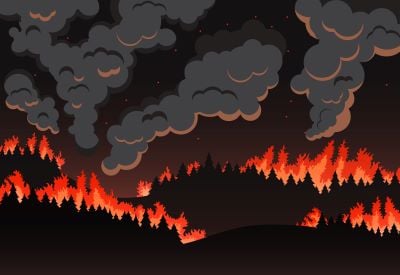Riding the Wildfire Wave
Riding the Wildfire Wave

This blog was originally written in 2017 About the Santa Rosa Wildfires
2 am Monday morning. I am awakened by the sound of my husband’s cell phone ringing. He doesn’t answer it and I reach for the light. The electricity is off. My throat feels raw and the air is thick with smoke. I leap out of bed shouting for Doug to wake up and my cell is ringing now. I answer it with one hand as I pull on pants with the other. Our friend Steve shouts in my ear, “Get out of there, right away!” “We are!” I answer.
Using cell phones as flashlights, Doug and I race through the dark house grabbing our laptops and photo albums. In the street outside a bullhorn voice bares, “Evacuate Now!” We throw what we’ve grabbed into the trunk of the car and as Doug pushes the garage door open, we see our neighbors loading into their cars, shadows in the white fog of headlights. The air is hot as a summer’s day and through the trees I see a glowing crimson. As I maneuver the car through the street, I grip the steering wheel tight, holding on to something solid as behind me, so much of what I love slips away.
Twenty minutes later I turn the key in the lock of my mother’s studio apartment in Sebastopol, 15 miles away from Santa Rosa CA. We wake her gently and flip on the TV in her bedroom. At 85 years-old, my mother is mildly cognitively impaired, but she is calm as we watch the news, trying to understand what happened. I feel like I’m dreaming yet I’m hyper alert and awake. We are alive, I think. It was a full-blown fight-freeze-flight situation and I responded. Thank you, monkey mind!
For the rest of the night and all morning my mind races, reliving our escape over and over. Monday afternoon, almost 24 hours exactly after the call that woke us, I receive a call from a trusted neighbor confirming that our home is burnt to the ground. It was as I expected. I felt numb. That night I collapse into a long deep sleep.
The next morning some friends call about a possible rental space and my husband and I go to see it. It is so rough with just a wood stove for heat. It would need much work, and it could never be home to me. That’s when the impact of what had happened hits. I am by nature a homebody and I loved my home. I need a place where I can recharge and regenerate. The simple comfort of my soft sheets to crawl into, my husband and dog to cuddle up with, is one of the greatest pleasures I have. My kitchen, where I love to cook and listen to music. My desk overlooking the Santa Rosa valley. It’s all gone! Our friends are talking to me about the place and about the fire but I can’t track what they are saying. I quietly tell Doug, “I need to go.”
In my work I teach my clients to welcome anxiety and other negative emotions, that they are natural expressions of the limbic brain that is devoted to our safety and survival, what I like to call the monkey mind. Now, here was the sorrow of loss, square in my path.
Back at my mother’s studio I sat on the couch next to her as she knitted. My body began to shake and I curled into her lap. My heart ached in the most literal sense of the word. “Put your hand on the back of my heart,” I said. I felt the warmth of her hand and let in penetrate. “I don’t have a home, I love my home,” I sobbed.
I cried for half an hour in my mother’s arms. I cried until I was dry and exhausted. I felt calm. My mind was empty. I was floating in the quiet trough until the next wave hit.
As a therapist and author who specializes in stress and anxiety, and has lost my home in the Santa Rosa fire, I am writing this blog to remind myself of the powerful tools I use in my practice with my clients. If It helps others to deal with their own challenges, nothing would please me more.
Originally written in 2017 about the Santa Rosa Wildfires
Read Part Two: The Challenge of Uncertainty












